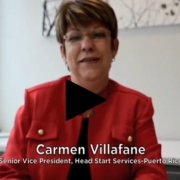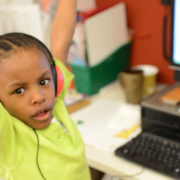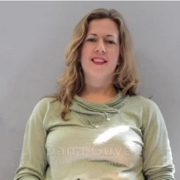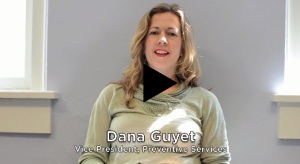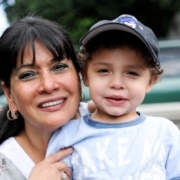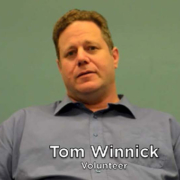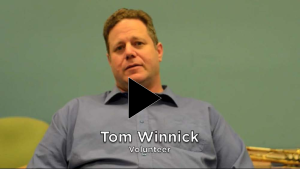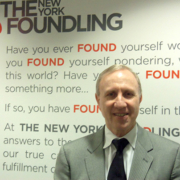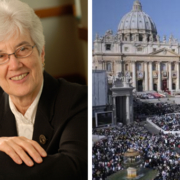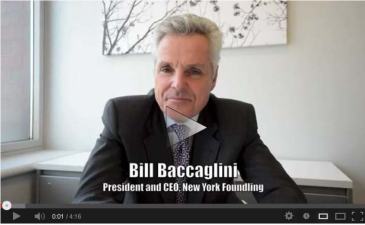Carmen Villafañe is Senior Vice President, Head Start Services for the New York Foundling en Puerto Rico. She has a master’s degree in Education with a specialty in Supervision and Administration of Schools from the University of Puerto Rico. Carmen has worked in Head Start programs since 1973 and began her career as a preschool teacher. She became an Education Manager for The Foundling’s program in 1985 before being promoted to Director of Head Start and Early head Start in 2006.
Click below to watch Carmen’s video blog en Español!

Having opened its doors more than 140 years ago, The New York Foundling is a well-respected New York City institution. Readers may be surprised, however, to find out that we have had a presence in Puerto Rico, serving low-income families since 1972. The Foundling began its presence in Puerto Rico to address the need to care for a number of our children in foster care whose families were moving back to Puerto Rico. Eleven years after we first became involved there, the government offered to accept proposals to set up a Head Start program in Puerto Rico. Feeling that we were qualified and also had local experience already, we applied and were given a grant.
Head Start is a granted program of the US Department of Health and Human Services that promotes school readiness to low-income children ages 3-5 at no cost. The program also works to teach parents how to become life-long advocates, educators, and role models for their children. Our Early Head Start program serves pregnant women, parents, and children ages 0-3, and helps families build a strong parent/child relationship. Currently, The New York Foundling’s Puerto Rico Head Start and Early Head Start programs together serve 1,090 children in the areas of San Juan, Cataño, Coamo, and Vega Alta, Puerto Rico. Twenty-two percent of the children we serve have disabilities ranging from learning disorders and speech language disabilities to cognitive disability and emotional disturbances, although we are by law only required to accept 10 % of these children. In order to apply for the program, parents simply need to find at a Head Start Center in their community, complete an application and submit documentation to see if they can be enrolled.
The program helps address issues in communities in Puerto Rico including drug addiction, obesity and poverty and seeks to end the incidence of poverty by generation and the negative health effects associated with it. Additionally, the program aims to help participants gain and utilize self-confidence and success skills at present and later in life. The program provides a healthy learning environment, ensures successful child development, and promotes community engagement.
The program works with outcomes for both the children and parents. The curriculum for the children includes basic learning areas such a math, literacy, and creative art activities as well as functional and emotional activities. Social workers establish goals for every family and teachers record data about the children daily for progress reports. To decipher if expectations are being met, each child is assessed three times per year and child progression is discussed with the parents. In addition, the program itself is regularly evaluated by administering interviews with staff and parents. Children who have successfully completed the program, will be excited about learning upon entering kindergarten, will have grown in self-awareness and self-esteem, will read with enjoyment, and will have developed socially, emotionally, and academically.
Through the program, we guide parents in how to best support their children by inviting them into the classroom to be volunteers, to serve alongside and learn from the classroom teachers, and to create an instructional environment in their homes. Parents are taught how to maintain a healthy and financially secure environment for their families and the importance of the physical, cognitive, social, and emotional development of their children. Parents who have successfully completed the program feel responsible for their own children’s development and learning experiences, provide a stable medical home, and understand the need for ongoing learning experiences for the entire family. They know how essential reading aloud and verbal communication is to language development and embrace their role as a lifelong educator for their child.
Our program serves children either in a classroom setting Monday through Friday from 7:30 a.m.-2:30 p.m. or, in the more rural areas, through home-based visits once a week for an hour and a half at a time coupled with socialization classroom sessions two days per month. In an effort to accommodate working parents or those attending college, The Foundling offers extended hours in certain locations. Head Start also provides job training, leadership skills and employment assistance to parents, as working with parents is one of our main objectives. In fact, 75 % of our parents voluntarily participate in workshops to help them become better advocates for their children and planners in the community.
The Puerto Rico Head Start and Early Head Start program employs 373 staff members. This includes teachers, assistant teachers, social workers, nurses, mental health professionals, nutritionists, cooks, and special needs specialists. Of these employees, 98 are former parents. Parents have the opportunity to participate in the decision making process. There is a policy council and more than half of the members are parents. The other members are community and agency partners who are advocates of the program.
We’re so proud that when our children leave the program they are prepared with the readiness and skills to enter kindergarten. We’re also so proud that some of our teachers have been Head Start children themselves, which demonstrates the success of our program. We look forward to continuing our successful program and making the future brighter for so many deserving families.
Watch Carmen’s blog en Español!
www.nyfoundling.org www.nyfpr.org




